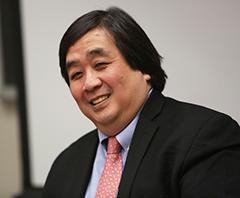Harold Hongju Koh Shares Lessons of Lifelong Lawyering in Intimate Gathering with Students
Former Legal Adviser to the State Department Recounts Wisdom from a Remarkable Life
New York, April 30, 2014—Public interest lawyers can build meaningful careers by upholding core principles and choosing to serve clients who have the greatest need, said Columbia Law School Adjunct Professor Harold Hongju Koh at an intimate “fireside chat” with students on April 3rd.
Koh, perhaps best known as the former Legal Adviser of the U.S. Department of State from 2009 to 2012, is a renowned human rights advocate and, as Dean for Social Justice Initiatives Ellen P. Chapnick said in opening remarks, “a man who needs no introduction.”
| Harold Hongju Koh, former Legal Adviser to the U.S. State Department, shared insights with students. |
A leading and prolific expert on public and private international law, national security law, and human rights, Koh has taught at Yale Law School since 1985 and served as its dean from 2004 to 2009. In addition to his role as Legal Adviser of the State Department, he served as U.S. Assistant Secretary of State for Democracy, Human rights, and Labor and on the Secretary of State’s Advisory Committee on Public International Law. He is the 2003 recipient of the Wolfgang Friedmann Award from Columbia Law School’s Journal of Transnational Law for outstanding contributions to the field of international law.
“There is a great human rights tradition at Columbia Law School, with people like Michael Ratner, Jack Greenberg, Lou Henkin, Gerry Neuman, and Sarah Cleveland,” Koh said. “I urge you to follow in their footsteps.”
For more than an hour, Koh shared a candid and extemporaneous array of anecdotes and insights about his formative experiences, engaging a packed conference room with stories that were alternately amusing and deeply moving.
Koh talked about his father, who rose through the South Korean government before a military coup in the early 1960s left him exiled and unemployed with a large family to support. While most of his peers found ways to work within the new military government, Koh’s father won their undying respect for refusing to compromise on his principles.
“The people who worked for the junta had all these material possessions, but no one will remember them,” Koh said. “He would say to me, ‘If you stand for nothing, you will fall for anything.’”
Koh argued that working in public interest is not only fulfilling, but presents a distinct set of challenges that help forge better practitioners.
“Public interest is infinitely rewarding and it gives you more experience and responsibility sooner,” Koh said.
Recounting when Secretary of State Madeleine Albright had asked him to join the State Department in the 1990s, Koh said that he accepted the job on the explicit condition that, if an emergency arose, he would have quick phone access to her, no matter where in the world she was, nor what time of day it was when he called. Albright agreed, and Koh accepted the job. Later, when other State personnel disregarded his judgment and insisted on changing language in already-cleared congressional remarks that Koh was to give, Koh picked up the phone and spoke with Albright, who told the others to restore his version. Koh said he never had to call her again.
“Over time, if you take tough and principled positions, some people aren’t going to like you,” Koh said. “But there are things more important than being liked.”
Koh also took questions from students, including many who are deciding between public interest and private sector jobs. Reflecting on his remarkable career, he encouraged students and young lawyers to nurture their social conscience in professional practice.
“The answer to why you went to law school can’t just be to pay back your loans,” Koh said. His parting words of wisdom: “Pick clients as much as they pick you. You may think you don’t know what you’re doing, that it’s all random, but if you follow your heart, then one day you will find that you’re doing what you were born to do.”
